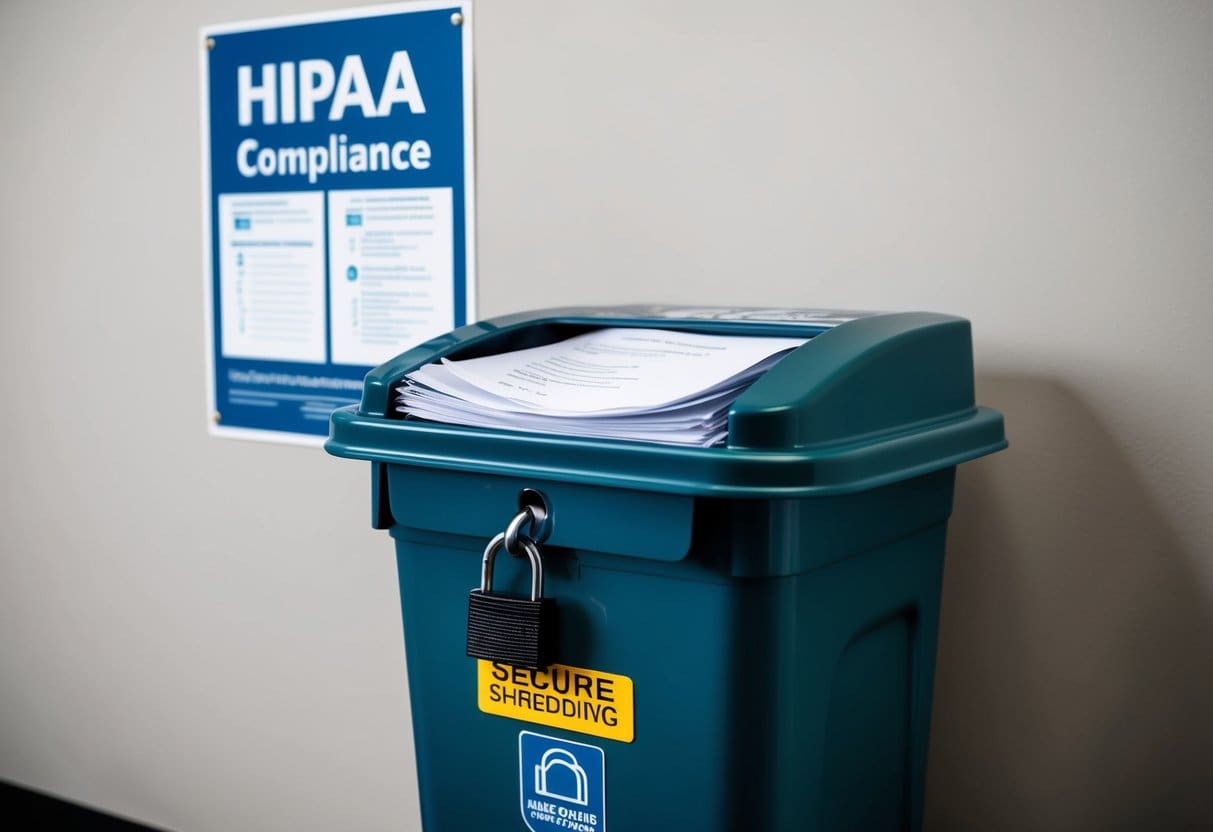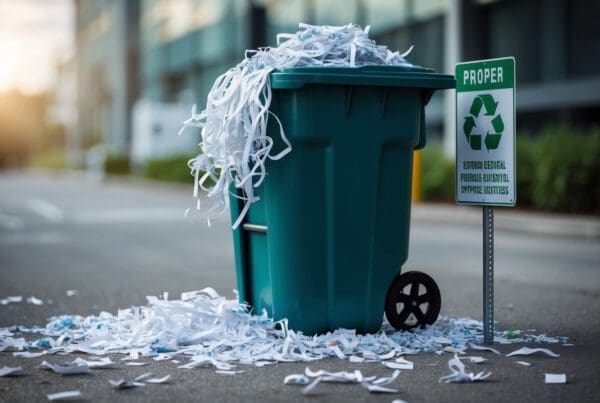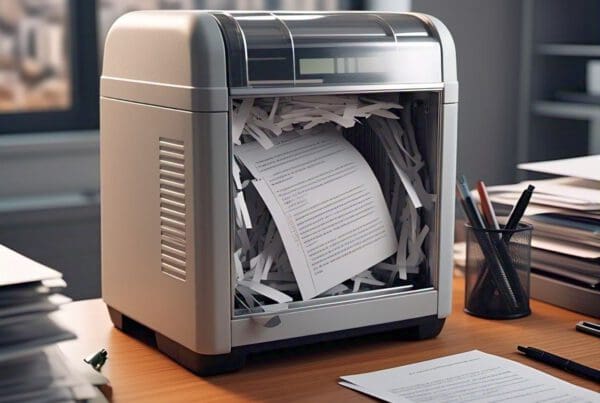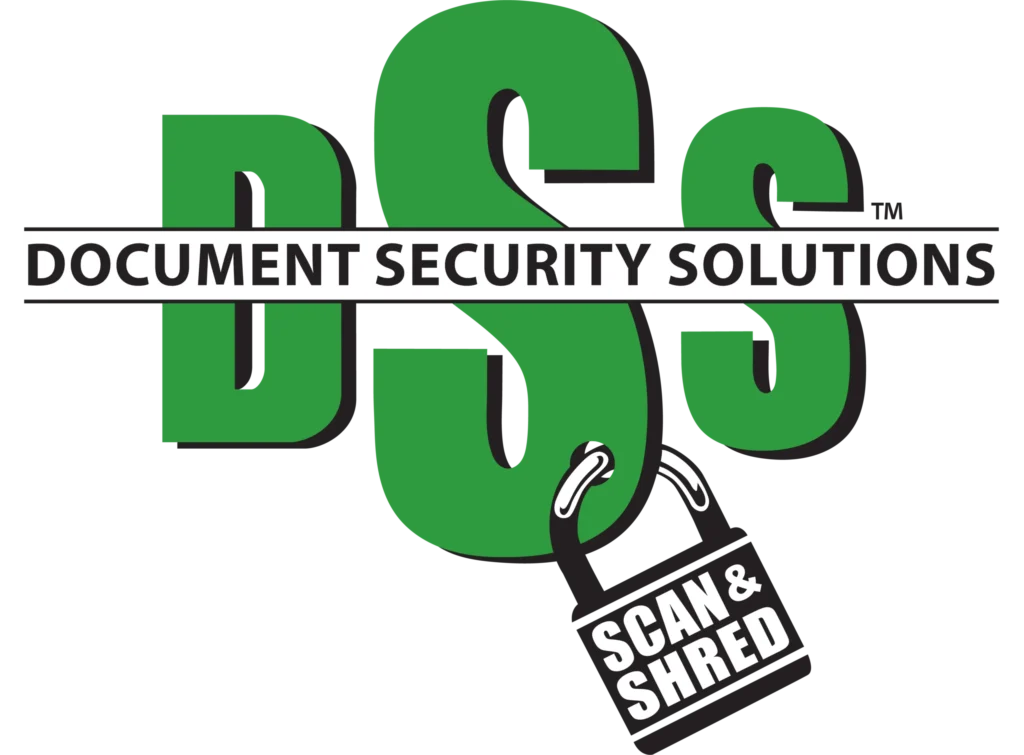Understanding HIPAA and Its Implications for Document Shredding
HIPAA plays a critical role in protecting patient privacy, especially when handling sensitive health information. Companies in Georgia must ensure proper document shredding to comply with these standards.
Basics of the Health Insurance Portability and Accountability Act
HIPAA was established to ensure the confidentiality and security of health information. It sets mandatory guidelines for handling and protecting health data.
For companies, this means following rules for the secure processing and disposal of medical records. Any mishandling can lead to serious legal consequences, including penalties and fines.
We should be diligent in knowing these rules to protect patient privacy in our operations.
HIPAA Privacy Rule and Protected Health Information
The Privacy Rule under HIPAA specifies how protected health information (PHI) should be handled. It applies to paper records and personal data such as patient names and addresses.
Our compliance with this rule requires us to implement strict safeguards. The rule mandates that we prevent unauthorized access and disclose PHI only with consent.
Ensuring proper shredding of documents is a crucial step in guarding this information.
Document Retention and Destruction Policies
Under HIPAA, document retention policies are equally important. Companies must retain medical records for a set time, typically dictated by state laws.
For Georgia, keeping records for at least six years is a standard practice. Once this period ends, secure destruction methods, including shredding, must be applied.
Our responsibility is to develop clear policies that guide us in this process, ensuring full legal compliance.
Shredding Compliance for Georgia Companies under HIPAA
Compliance with HIPAA is crucial for Georgia companies handling sensitive information. Proper document shredding ensures that protected health information remains secure. We focus on compliant shredding practices, choosing the right shredding company, and the importance of employee training.
HIPAA Compliant Document Shredding Practices
To comply with HIPAA, companies must follow strict shredding practices. Documents containing protected health information need secure handling. On-site shredding can ensure immediate destruction and reduce risks associated with off-site transportation.
A certificate of destruction should be obtained after shredding to verify compliance. This document serves as proof that materials were securely destroyed. We advise regularly reviewing shredding processes to align with current HIPAA regulations.
Selecting a HIPAA Compliant Shredding Company
Choosing the right shredding company is key. It’s important to verify that the shredding service adheres to HIPAA standards. We look for companies offering secure and efficient processes.
Request proof of HIPAA compliance and inquire about security protocols. Often, companies provide on-site services, adding an extra layer of security. Reliable shredding services should offer a certificate of destruction to confirm the proper handling of sensitive information.
Ensuring Employee Training and Protocols
Employee training is vital for maintaining compliance. Our teams need regular training on handling documents containing health information. Training should cover HIPAA regulations and how they apply to document destruction.
Staff should understand protocols for identifying and securely shredding sensitive documents. Establishing clear procedures and regular training ensures that employees adhere to compliance standards. This minimizes risks of breaches and helps maintain a secure environment.
Best Practices in Data Protection and Shredding

Data protection and shredding are crucial for maintaining privacy and avoiding data breaches. Implementing strong processes helps ensure compliance, protects customer information, and avoids the risks of noncompliance.
Implementing a Document Management System
We prioritize having a reliable document management system. This system helps track and organize sensitive documents efficiently. It ensures healthcare professionals can access and manage records securely.
Benefits include:
- Easy access and retrieval of documents
- Better organization
- Improved security features
Implementing such a system also reduces the risk of human error, which can lead to data breaches. By automating document storage and shredding schedules, we maintain control over the document lifecycle, ensuring timely and secure destruction.
Customer Service and Privacy Maintenance
Customer service plays a vital role in maintaining privacy. We must train our team to handle customer data respectfully and securely. Listening to customer concerns about data privacy builds trust and ensures we meet their expectations.
Implementing strict access controls helps protect customer information. By limiting data access to authorized personnel only, we further assure privacy. Regular audits and updates to our privacy policies reinforce our commitment to safeguarding data.
Handling Data Breaches and Noncompliance
Data breaches can be costly, so we take proactive steps to prevent them. In case of a breach, immediate action is crucial. We have a response plan in place to address and resolve breaches quickly.
This plan involves:
- Notifying affected individuals promptly
- Taking measures to protect impacted data
- Investigating the cause of the breach
To avoid noncompliance, we constantly review and update our practices according to legal requirements. Coordinating with document shredding services ensures proper destruction of confidential information. Through regular training and audits, our team remains prepared to handle potential security issues efficiently.





